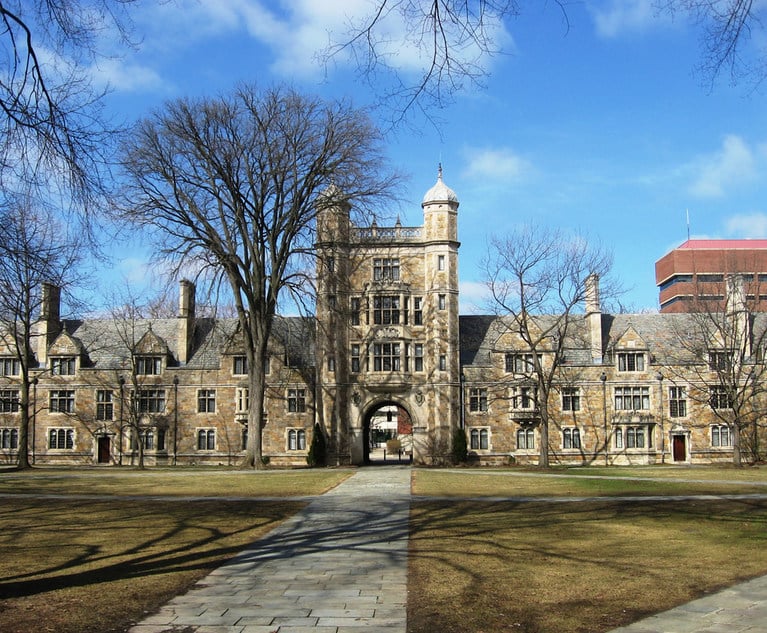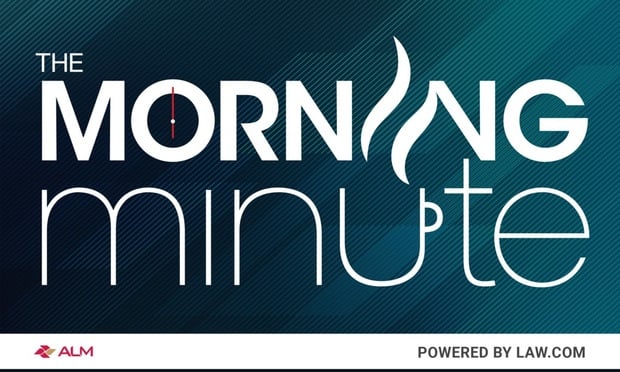Can Big Law Keep Burning the Candle at Both Ends? | Another State Ponders Mandated Lit Funding Disclosures | Starbucks-Owned Bread Company Sues Restaurant Group: The Morning Minute
The news and analysis you need to start your day.
April 26, 2021 at 06:00 AM
5 minute read
Want to get this daily news briefing by email? Here's the sign-up.
WHAT WE'RE WATCHING
THE DAYS HAVE GOTTEN LONGER - By now, saying law firms are going to have a hard time recreating 2020′s profit margins in 2021 is like saying clients would like to spend less on outside counsel—it's absolutely true but it's not exactly news. As many industry observers have noted, austerity measures like staff cuts and travel reductions, which helped bolster PEP for many firms last year, are not really repeatable. But a tidbit in this story from Law.com's Brenda Sapino Jeffreys on the Am Law 100 stuck out as being particularly interesting because there hasn't been nearly as much discussion about it. Paula Alvary, a principal at consultant Hoffman Alvary in Newton, Massachusetts, observed that, in addition to decent demand and reduced overhead, firms also benefitted last year from the fact that lawyers working remotely in a pandemic environment didn't take as much vacation or spend time traveling for work. "All of these things translated into many lawyers simply working a little bit more every week—and that had a huge impact on earnings," Alvary said. That, of course, raises the question: as attorneys and staff battle burnout and fatigue this year, some firms begin bringing people back to the office and travel starts to resume, will that level of productivity prove to be just another one hit wonder of 2020?
WHO'S BEHIND YOU? - Litigation funding arrangements would be an open book in New Jersey's federal courts under a proposed change to the local civil rules, Law.com's Charles Toutant reports. Lawyers who get financial assistance from nonparties for legal fees and expenses would be required under the proposed rule to disclose the funder's name and address, whether the funder's approval is needed for litigation or settlement decisions, and what terms and conditions apply to such approvals. Unsurprisingly, the litigation funding industry is not psyched. "The proposed rule is an overbroad answer to a problem that simply doesn't exist. A variety of current litigation disclosure rules already meet the public's needs and serve its interests," said Shannon Campagna, executive director of the International Legal Finance Association. But independent observers have also expressed concern. Anthony Sebok, a law professor at Cardozo Law School in New York who studies litigation funding, said that, in his opinion, "the actual motivation for these rules is not about judicial independence, it's to make it easy for the adverse party to know whether or not there's funding, and then to launch all sorts of satellite motions to throw sand in the gears of litigation."
THAT'S A LOT OF BREAD - Sheppard, Mullin, Richter & Hampton filed a breach-of-contract lawsuit Friday in California Northern District Court on behalf of Bay Bread, an artisan bakery chain acquired in 2012 by Starbucks. The suit targets Lemonade Restaurant Group in connection with the restaurant's assumption of four leases that are now subject to rent payment disputes. Bay Bread alleges in its complaint that it has suffered damages in excess of $892,000. Counsel have not yet appeared for the defendants. The case is 3:21-cv-02979, Bay Bread, LLC, a Delaware limited liability company et al v. Lemonade Restaurant Group, LLC, a Delaware limited liability company et al. Stay up on the latest deals and litigation with the new Law.com Radar.
EDITOR'S PICKS
This content has been archived. It is available through our partners, LexisNexis® and Bloomberg Law.
To view this content, please continue to their sites.
Not a Lexis Subscriber?
Subscribe Now
Not a Bloomberg Law Subscriber?
Subscribe Now
NOT FOR REPRINT
© 2025 ALM Global, LLC, All Rights Reserved. Request academic re-use from www.copyright.com. All other uses, submit a request to [email protected]. For more information visit Asset & Logo Licensing.
You Might Like
View All

From Laggards to Tech Founders: Law Firm Innovation Is Flourishing

Inside Track: Cooley's Modest Proposal to Make Executives Safer

Law School Applications are Up Across the Country. Law Deans Aren't Sure Why
6 minute readLaw Firms Mentioned
Trending Stories
- 1States Accuse Trump of Thwarting Court's Funding Restoration Order
- 2Microsoft Becomes Latest Tech Company to Face Claims of Stealing Marketing Commissions From Influencers
- 3Coral Gables Attorney Busted for Stalking Lawyer
- 4Trump's DOJ Delays Releasing Jan. 6 FBI Agents List Under Consent Order
- 5Securities Report Says That 2024 Settlements Passed a Total of $5.2B
Who Got The Work
J. Brugh Lower of Gibbons has entered an appearance for industrial equipment supplier Devco Corporation in a pending trademark infringement lawsuit. The suit, accusing the defendant of selling knock-off Graco products, was filed Dec. 18 in New Jersey District Court by Rivkin Radler on behalf of Graco Inc. and Graco Minnesota. The case, assigned to U.S. District Judge Zahid N. Quraishi, is 3:24-cv-11294, Graco Inc. et al v. Devco Corporation.
Who Got The Work
Rebecca Maller-Stein and Kent A. Yalowitz of Arnold & Porter Kaye Scholer have entered their appearances for Hanaco Venture Capital and its executives, Lior Prosor and David Frankel, in a pending securities lawsuit. The action, filed on Dec. 24 in New York Southern District Court by Zell, Aron & Co. on behalf of Goldeneye Advisors, accuses the defendants of negligently and fraudulently managing the plaintiff's $1 million investment. The case, assigned to U.S. District Judge Vernon S. Broderick, is 1:24-cv-09918, Goldeneye Advisors, LLC v. Hanaco Venture Capital, Ltd. et al.
Who Got The Work
Attorneys from A&O Shearman has stepped in as defense counsel for Toronto-Dominion Bank and other defendants in a pending securities class action. The suit, filed Dec. 11 in New York Southern District Court by Bleichmar Fonti & Auld, accuses the defendants of concealing the bank's 'pervasive' deficiencies in regards to its compliance with the Bank Secrecy Act and the quality of its anti-money laundering controls. The case, assigned to U.S. District Judge Arun Subramanian, is 1:24-cv-09445, Gonzalez v. The Toronto-Dominion Bank et al.
Who Got The Work
Crown Castle International, a Pennsylvania company providing shared communications infrastructure, has turned to Luke D. Wolf of Gordon Rees Scully Mansukhani to fend off a pending breach-of-contract lawsuit. The court action, filed Nov. 25 in Michigan Eastern District Court by Hooper Hathaway PC on behalf of The Town Residences LLC, accuses Crown Castle of failing to transfer approximately $30,000 in utility payments from T-Mobile in breach of a roof-top lease and assignment agreement. The case, assigned to U.S. District Judge Susan K. Declercq, is 2:24-cv-13131, The Town Residences LLC v. T-Mobile US, Inc. et al.
Who Got The Work
Wilfred P. Coronato and Daniel M. Schwartz of McCarter & English have stepped in as defense counsel to Electrolux Home Products Inc. in a pending product liability lawsuit. The court action, filed Nov. 26 in New York Eastern District Court by Poulos Lopiccolo PC and Nagel Rice LLP on behalf of David Stern, alleges that the defendant's refrigerators’ drawers and shelving repeatedly break and fall apart within months after purchase. The case, assigned to U.S. District Judge Joan M. Azrack, is 2:24-cv-08204, Stern v. Electrolux Home Products, Inc.
Featured Firms
Law Offices of Gary Martin Hays & Associates, P.C.
(470) 294-1674
Law Offices of Mark E. Salomone
(857) 444-6468
Smith & Hassler
(713) 739-1250









